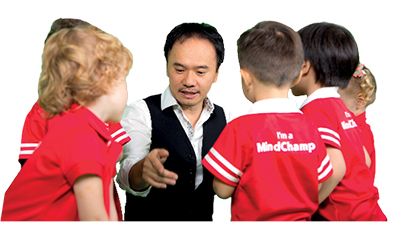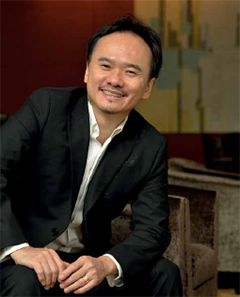 Having arrived in Australia at the age of nine without being able to speak a word of English, but graduating from Junior College as the first student ever to be awarded three medals of honour in the diverse fields of English, Mathematics and Art, David Chiem firmly believes in the value of education.
Having arrived in Australia at the age of nine without being able to speak a word of English, but graduating from Junior College as the first student ever to be awarded three medals of honour in the diverse fields of English, Mathematics and Art, David Chiem firmly believes in the value of education.
He graduated with a BA (Communications) from the University of Technology, Sydney and a Master's of Film-making from the world-renowned Australian Film, Television and Radio School (AFTRS), but realised that his calling was in the world of education.
In 1998, he established MindChamps as an educational research centre in Australia, drawing together concepts in education, psychology, neuroscience and theatre to develop and deliver mind-development programs for children of all ages, focusing on "the Art of Learning How To Learn" and the "淒evelopment of a Champion Mindset" (based on research by Prof Allan Snyder, founding director of the Centre for the Mind, University of Sydney). MindChamps established its world head institute in Singapore in 2002. To date, MindChamps has established 31 preschool and learning centres in Singapore, and over 60,000 students from preschool to university level have graduated from MindChamps internationally.
He shared with EduNation some of his thoughts about the limitations of teaching subjects in "silos" and the difficulty this causes for students in making connections between different topics and subjects. He also discussed the issue of "mindsets" and the need to teach students how to learn.
"teaching in silos"
EN: Over the years, you've obviously had a lot of interaction with many families, both children and parents, who are here in the Singapore system. What have you observed about them?
Chiem: I've been in Singapore now for about 13 years. MindChamps has 31 preschools and various specialist learning programmes, so we see thousands of kids every year. What's amazing to me is that although we spend billions on education every year, there are still many kids who will fail at PSLE, for example, in Math. They study it five days a week for six years, and still get to that sixth year and fail. Why is it that we accept that after six years of school a child can still not understand some fundamental concepts? Why do we accept the paradigm that there will be a percentage who will "Inevitably" fail and say that they hate Math, or English, or Science?
 MindChamps was founded to investigate these gaps. We realised that in society, most of the time, we are taught what to learn - the content - but not how to learn - the strategies and mindset of the life-long learner. MindChamps was founded to investigate these gaps. We realised that in society, most of the time, we are taught what to learn - the content - but not how to learn - the strategies and mindset of the life-long learner.
One of the biggest issues we identified in our research was the problem of what we call "teaching in silos". As students, we learned English, Science and Math, and even within Math, we learned arithmetic, algebra, geometry, etc., all in silos. Unless we were lucky enough to get the right teacher, we never saw them as having relationships with each other. We never realised that they were integrated, and because we learned them all in silos, each part was like a single jigsaw piece.
[Pointing to the cover of a magazine] If we look at the whole picture first, discuss "What is this about?" then cut it up into 20 pieces, tomorrow when we come back, there's a good chance that our brain can put it back together. But what if you had never seen what this is about? What if you walked in and we gave you one piece at a time? If you didn't understand the relationship between the pieces, it would be much harder.
In many places the style is this: drill, drill, drill, five days a week. If five days a week doesn't work, we force the kid to do it for six days. What makes us think that six days a week will work? Einstein put it this way: "there can be no more certain sign of insanity than to do the same thing over and over and expect the result to be different."
Neuroscience shows that the brain learns by making connections. If we're teaching subjects in silos, we're not maximising the brain's most effective way of learning. When we teach in silos, we are not nurturing the students to learn in the most brain-effective way.
EN: So you're saying that it would be better if our school curriculum were redesigned so that the subjects are more interconnected, and less in silos?
Chiem: The system should be more integrated so that the mind is encouraged to make connections and recognise relationships. Most of us, in school, were drilled in one jigsaw piece at a time. We rote-learned content and passed exams, but by the time we were adults, it was virtually all gone. So, yes, I really think we have to re-integrate the curriculum.
How negative mindsets develop
Because we are obsessed with "grading" our children, marks become the only measure of success. If a child learns in a different way, we label them and they start to believe it, and it becomes a mindset - "I'm no good in Maths". It is a mindset that follows them through life.
 Everything you learn has a relationship with something else. If you miss something and there is gap, the gap grows over the years. If the child gets scolded for asking, he will decide that it's safer not to ask, and a mindset develops - of being afraid to ask when you don't know. This is a fear that is inculcated from young. Everything you learn has a relationship with something else. If you miss something and there is gap, the gap grows over the years. If the child gets scolded for asking, he will decide that it's safer not to ask, and a mindset develops - of being afraid to ask when you don't know. This is a fear that is inculcated from young.
Another example of developing a negative mindset - say you have a child who likes to play soccer, but he's failing Math, so you say, "No more soccer! Do more Math!" Because of Math, you took away what he loves. Is it any wonder he hates Math? Once a child develops the mindset that says, "I hate it". we're dealing with a difficult uphill battle.
Making connections through engagement
Over thousands of years, Theatre has perfected the craft of engagement. Every audience will be slightly different, but the fundamentals of the craft of engagement are the same. Spielberg can create a movie that can keep millions of kids engaged. He can move them to laughter, and to tears. The logical brain knows it's fake, but the non-conscious mind is engaged. The same content given to a different director could be a flop; given to Spielberg, it moves the world. To engage the non-conscious part of the brain, you have to help it to make its own connections. So, if you can teach a child in a way that engages their curious mind, that mind makes its own connections, then concepts and even metaconcepts start to form. Not every child will say, " like this so much I want to be mathematician," but no child should fail Math. Every child should do at least well enough to be proud of what he or she has done.
In the movie world, you can produce a $100 million movie, with all the special effects and technology, but if the relationships between the characters are not strong, you have no engagement, and you will get bored. A story only works and engages you when you understand the relationships. Study is exactly the same - you have to understand the relationships between the separate elements and subjects.
In Singapore
EN: Do you think that the Singapore system is getting worse in the sense of being more divided into silos and exam-driven?
Chiem: I do feel that it's getting better, and it's moving in the right direction. Slowly, we're developing a more thinking curriculum - a little less drilling, with more values and character-building. I think we are moving in the right direction, but we're not making paradigm shifts.
EN: For a lot of parents, their concern is the results, and they like to work towards the results from day one. Even if the education system emphasises the building of connections, presumably, just before the exams, the students will still be required to prepare for the individual papers?
Chiem: Of course. But you know what? If a student writing a paper for Economics or whatever has a fuller, deeper understanding of what they are writing about, those will be the top students. The students who are reproducing what they have been drilled in and memorised can only see the surface level. "A" students make connections and show understanding of and engagement with the topic.
 The real world beyond school no longer needs you to regurgitate things. Information is everywhere, at the click of a mouse. It's what you do with the information that counts. That's why, generally, our students here get a bit of a shock when they go overseas. Someone I know went overseas to do his master's degree. He told me, "Wah! you've got to think!" The real world beyond school no longer needs you to regurgitate things. Information is everywhere, at the click of a mouse. It's what you do with the information that counts. That's why, generally, our students here get a bit of a shock when they go overseas. Someone I know went overseas to do his master's degree. He told me, "Wah! you've got to think!"
The key question - "What is it about?"
What we have to do is change the way we view the whole educational paradigm. We need to teach in a way that allows students to see what the topic is all about. I'll give you a perfect example: the Lord of the Rings movies. If you remember watching the first one, you recall it had a conclusion, but it was clear that the story wasn't finished. You knew it was going to continue. You can be a genius like Einstein, but if you never saw Part 1 or Part 2, there will be things in Part 3 you won't understand - why do they need to go through all those hardships and dangers to bring the Ring to that place? If you don't understand that, the whole metaphor doesn't work.
If our goal is to develop an understanding of the relationships that exist within and between subjects, then it is easier for the student to make sense of the whole - and the elements they may have missed. I think we should be teaching all subjects from the perspective that, first and foremost, the child has to understand what it is about.
Top suggestion for parents
EN: What is your top suggestion for parents? What can they do at home to encourage their children's learning?
Chiem: One thing we do in MindChamps is to nurture the thinking behind the thinking, to teach students to ask "What is this really about?"
 So when the student, having considered the underlying connections, sits down to study the subject, the brain makes its own connections and everything starts to fit. We see how and why the jigsaw pieces fit. It works for every subject: Math is the same, Art is the same, English is the same, every subject is ultimately about concepts. So, the top thing I would always encourage parents to do is to nurture their child's thinking by asking, even when playing games or watching a movie or looking at an advertisement on a bus, "What is it about?" and not "What happened?" That's developing high-order thinking. Once we see the purpose or the thinking behind something then we can talk about what they put in there to communicate their message. If we nurture that from preschool and it becomes a habit, then their minds start to love learning because, by nature, the brain loves to make connections. When we're inculcated that habit and love for learning, school is going to be much easier because the child's mind says "I love learning". And that's something we parents can nurture every day, free of charge, everywhere we go. We can ask, "that conversation we're been having, what's that about?" and have fun discussing it. You hear a joke, "What's that about?" A joke makes you laugh, but there's often a metaphor there - a reason why we laugh. So when the student, having considered the underlying connections, sits down to study the subject, the brain makes its own connections and everything starts to fit. We see how and why the jigsaw pieces fit. It works for every subject: Math is the same, Art is the same, English is the same, every subject is ultimately about concepts. So, the top thing I would always encourage parents to do is to nurture their child's thinking by asking, even when playing games or watching a movie or looking at an advertisement on a bus, "What is it about?" and not "What happened?" That's developing high-order thinking. Once we see the purpose or the thinking behind something then we can talk about what they put in there to communicate their message. If we nurture that from preschool and it becomes a habit, then their minds start to love learning because, by nature, the brain loves to make connections. When we're inculcated that habit and love for learning, school is going to be much easier because the child's mind says "I love learning". And that's something we parents can nurture every day, free of charge, everywhere we go. We can ask, "that conversation we're been having, what's that about?" and have fun discussing it. You hear a joke, "What's that about?" A joke makes you laugh, but there's often a metaphor there - a reason why we laugh.
EN: It sounds like an extended Literature lesson!
Chiem: But you know what? It would be great if you then extend that to Math - every lesson in Math can be thought of in the same way. "What is that about? How do those two connect? What's the relationship?" Geometry has a direct relationship to Trigonometry which has a direct relationship to Calculus - but most of us in school were taught them in silos; we were not taught to see the relationships. If you teach using concepts rather than details, it's a different pedagogy.
The optimal state for learning is not happiness, but curiosity. When the brain is curious, it is making connections. Like when you're watching a movie - you're curious about what's going to happen next, you love being led to the next part. You are making your own connections about what may happen. The moment someone tells you what is going to happen, it ruins the whole thing. No more curiosity.
My perspective is that we need to nurture every child, from young, not to just look at what is in the subject - do this, do that, memorise the formula. If a student is just spoon-fed with all the facts, he can pass the exam, but how is he going to perform in the real world?
|
Mobile Phones
Children these days get stuck into these things so early [mimes playing a game on a mobile phone], and they become disengaged from their learning - but it's not their fault. Biologically, this is what's happening: From birth, our habits are programmed by repetition - what we do most often and with most enthusiasm become the foundation for future behaviours. This is the first time in the history of the human race where children's focus has been targeted for hours at a time, on something this small, less than 30 cm from their eyes. If we watch their eye movements, we see that their eyes and the muscles controlling them focus and concentrate within that small space for as long as they play their game, or watch their video. And then what do we do? In Primary 1, we tell our kids, "sit down, sit still, open up your books." The child opens up his book and looks at it. His eyes are not used to looking at something that is not moving. It's static, and he's not used to that. He can't get out of his seat, so he's got to look around. He looks around, he starts to do something, and gets into trouble, and once he gets into trouble, he thinks "I don't like this class". "this place is boring". Now we've created a mindset, the mindset of someone who says "I don't like school". We're fighting uphill now, because we're taken away the love for learning. This is very real - and very serious.
Ultimately, you really cannot ban access to mobile phones and tablets totally because the children will be socially disadvantaged - and besides, there are many advantages to being connected to the whole world via the internet. Children must be comfortable with such interconnectedness. Very little in the world is either/or; all or nothing. Take the knife as a metaphor. A knife can be dangerous or very useful. You can't ban all knives from a house, but you don't leave them around either - especially if there are young children in the house. In the end, it's about teaching our children responsibility and the value of discipline. That is our duty as parents. If we are too extreme (banning mobile phones), our children go to class under-prepared and feel socially excluded, but if we fail to create rules on the use and duration of online activities, other areas of their development -both social and intellectual - suffer. In the end, as with so many aspects of parenting, it's about teaching the value of responsibility and boundaries.
|
|